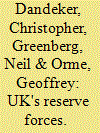|
|
|
Sort Order |
|
|
|
Items / Page
|
|
|
|
|
|
|
| Srl | Item |
| 1 |
ID:
098361


|
|
|
|
|
| Publication |
2010.
|
| Summary/Abstract |
The purpose of this article is to expand civil-military and military health research's concepts of stress with the addition of a theoretical construct of the concept known as "cultural stress." Military research often discusses combat and operational stress and its effect on soldiers but does not address unique culturally induced stressors created by the modern military's interaction with indigenous populations. Civilian research discusses stress as it relates to "culture shock" but does not account for unique pressures facing servicemen in both peacetime and wartime environments. This article synthesizes these concepts to produce a new conceptual basis of "cultural stress" from which further empirical research can be conducted.
|
|
|
|
|
|
|
|
|
|
|
|
|
|
|
|
| 2 |
ID:
094138


|
|
|
|
|
| Publication |
2010.
|
| Summary/Abstract |
U.K. Reserve Forces, principally the Territorial Army (TA), have been increasingly used since the end of the cold war, but there have been some concerns about their mental health problems and also possible unwillingness to remain in service. This article reports on the retention issues of 191 TA personnel who deployed to Iraq from 2003 to 2006. Qualitative data were thematically analyzed from three complementary studies. The authors found that, in 2003, negative aspects of Army organizational culture were reported as the prime reasons for TA personnel wishing to leave the military. In particular, Reservists reported their being unaccepted and underutilized. In contrast, by 2006, TA personnel were generally reporting being satisfied with their work as a Reservist and felt integrated with Regular colleagues. Those who stated they wanted to leave the military now reported it was primarily because of poor military family welfare support. These results suggest that although the British Army appears to have successfully managed the changing role and integration of the TA on operations, family welfare needs further consideration as an important influence on retention. Since the end of data collection for this study, new measures focusing on welfare have been introduced. Future work will assess the impact of these changes.
|
|
|
|
|
|
|
|
|
|
|
|
|
|
|
|
| 3 |
ID:
135370


|
|
|
|
|
| Summary/Abstract |
In the UK, armed services personnel are perceived to become institutionalised during service, with negative connotations, especially in the process of transition to veteran status. Beverly P Bergman, Howard J Burdett and Neil Greenberg argue that institutionalisation is an inappropriate model, and that becoming a member of the armed forces is better represented by a model of culture shock, with reverse culture shock being experienced upon leaving. The adoption of this model would be useful both in preparing UK service personnel for civilian life and in supporting them after transition, and may help to predict vulnerability.
|
|
|
|
|
|
|
|
|
|
|
|
|
|
|
|
| 4 |
ID:
104085


|
|
|
|
|
| Publication |
2011.
|
| Summary/Abstract |
This article focuses on how the role and structure of the UK's Reserve Forces have changed since their foundation before the First World War, with particular attention paid to the last two decades, during which time government has sought to make the Reserves more useable and relevant to post-Cold War military missions, including changing the legislative and administrative basis of their use. Since 9/11, Reserves have played an important role in the defense of the United Kingdom, particularly in operations in Afghanistan and Iraq, but the recent financial crisis has spurred further consideration of how best to structure and use this capability, which has been included as part of the recent Strategic Defence and Security Review (SDSR). The article analyses the current debate on whether the number of Reserve Forces should be cut or increased, and on how best to integrate their efforts with those of the Regular Forces. It also considers the evidence on the recent operational experience of Reserve Forces and its impact on a number of personnel issues, including recruitment, retention, and their health and well-being. The differences between the health and well-being outcomes for Reserve and Regular Forces are discussed and future lines of research enquiry highlighted, while the implications for the comparative analysis of Reserve Forces are also drawn out.
|
|
|
|
|
|
|
|
|
|
|
|
|
|
|
|
|
|
|
|
|